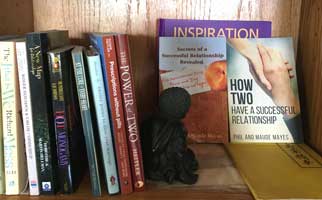Successful Relationship Reading Corner
 In this week's blog, we wrote about the paradox of union and separateness in a relationship. Here are some excellent articles on this subject. In this week's blog, we wrote about the paradox of union and separateness in a relationship. Here are some excellent articles on this subject.
The Central Paradox of Love: Esther Perel on Reconciling the Closeness Needed for Intimacy with the Psychological Distance That Fuels Desire "How to live with those paradoxes, rather than succumbing to the self-defeating urge to treat them as problems to be solved, is what Belgian psychotherapist and writer Esther Perel explores in Mating in Captivity: Unlocking Erotic Intelligence (public library). Drawing on decades of her own work with couples and a vast body of psychological literature, Perel offers an illuminating and consolatory perspective on intimate relationships and our conflicting needs for security and freedom, warmth and wildness."
How to Not Lose the "Me" When Becoming a "We" "The question is: how to be in a relationship and not lose yourself; how to be part of a We without losing Me. What makes being in a relationship tricky is that it provides the opportunity for two completely different experiences. On the one hand, it is an opportunity for two individuals to be supported by each other's appreciation and love for the person their partner is. Both partners are enhanced by such an association, and flourish and grow as people."
Relationship Success: Balancing Togetherness and Individuality "Maintaining individuality is critical to establishing a long-lasting, healthy partnership. Therefore, equal efforts between attending to oneself and making the relationship work are necessary. Personal boundaries are the limits we set for ourselves as individuals in relationships. They protect our sense of personal identity and help guard against being overwhelmed by the demands of others."
|
|